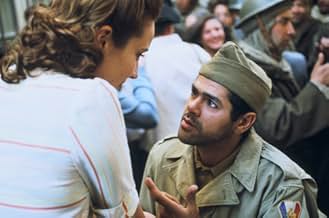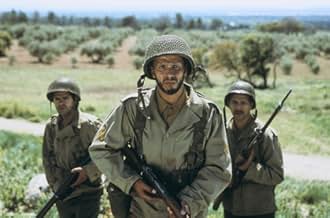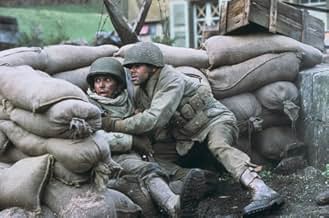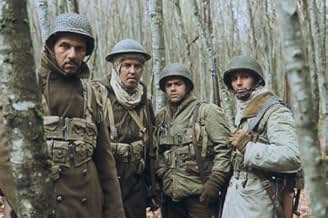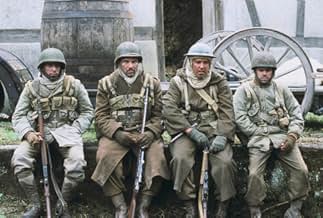VALUTAZIONE IMDb
7,0/10
15.290
LA TUA VALUTAZIONE
Aggiungi una trama nella tua linguaDuring World War II, four North African men enlist in the French army to liberate that country from German oppression, and to fight French discrimination.During World War II, four North African men enlist in the French army to liberate that country from German oppression, and to fight French discrimination.During World War II, four North African men enlist in the French army to liberate that country from German oppression, and to fight French discrimination.
- Candidato a 1 Oscar
- 9 vittorie e 16 candidature totali
Trama
Lo sapevi?
- QuizThe main actors, all of North African descent, did not know of France's discrimination towards foreign soldiers serving in the French army during World War 2 until filming began.
- BlooperIn the scene when the African soldiers raise the French tricolor over the Italian mountain top, the flag they use is polyester (i.e. a contemporary flag). World War II troops would have used a cotton flag.
- ConnessioniFeatured in Indigenes: Le making of (2006)
- Colonne sonoreLe lac des cygnes
Composed by Pyotr Ilyich Tchaikovsky
Recensione in evidenza
Days of Glory (Indigénes) can boast that it was the most important if not the most successful of the five films in the Oscars' Best Foreign Film category. After French Premier Jacques Chirac saw the film, he agreed to compensate all North Africans who fought in World War II by unfreezing their pensions, a result the director Rachid Bouchareb worked hard to achieve. Though conventional in its technique and lacking in any real character development, Days of Glory, a French Moroccan Algerian co-production, is an involving and heartfelt film whose outstanding ensemble cast won the award for Best Actor at the 2006 Cannes Film Festival.
The film depicts a group of North African volunteers who enlist in the French army to support the French resistance against the Nazis during World War II. The fact that they are fighting for a lesser group of colonial oppressors against a more virile one does not enter their mind and they are ecstatic with the thrill of being on French soil for the first time. Their shabby treatment, however, by bigots in the French army who deny them the privileges that they take for granted becomes the centerpiece of the film. Unlike the French, the North African recruits are not granted leave to visit their families, are not promoted, and are not even allowed tomatoes with their dinner.
The film opens in 1943 as the enlisted men say goodbye to their families in Algeria, Morocco, and Senegal to join the fight against the Germans. Bouchareb follows four men: Said (James Debbouze), a young Algerian is moved to enlist by a recruiter's sloganeering and his own desire to escape his economic hardship; Yassir (Samy Naceri) who joins in Morocco even though he cannot help being bitter toward the French government that killed his family in the name of pacification.
We later meet Messaoud (Roschdy Zem), a solid marksman who falls for a young French woman but their correspondence is intercepted and censored by the French and his "no luck" tattoo on his neck turns out to be prophetic. The strongest character in the film is Abdelkader (Sami Bouajila), whose outspokenness against the injustice shown to North African soldiers keeps him from being promoted but earns him a strong following. Said develops a close relationship with Sergeant Martinez (Bernard Blancan), a by the book Captain who nonetheless speaks up for the dedication of his men but when Said happens to suggest that Martinez is part Arab, their relationship ends swiftly and dramatically.
The high point of the film is the battle for a village in Alsace. It is a tense, emotionally harrowing sequence that is the equal of anything in Saving Private Ryan. Days of Glory has a strong point of view but is not didactic. It simply lets us see the face of discrimination against Arab soldiers during the war and the tension that arose in the French army because of it, a harbinger of colonial wars and urban tensions to follow. While the film unfortunately ends on a clichéd note, it is still quite moving and makes sure the brave soldiers from North Africa are acknowledged for their contribution, sadly overlooked these many years.
The film depicts a group of North African volunteers who enlist in the French army to support the French resistance against the Nazis during World War II. The fact that they are fighting for a lesser group of colonial oppressors against a more virile one does not enter their mind and they are ecstatic with the thrill of being on French soil for the first time. Their shabby treatment, however, by bigots in the French army who deny them the privileges that they take for granted becomes the centerpiece of the film. Unlike the French, the North African recruits are not granted leave to visit their families, are not promoted, and are not even allowed tomatoes with their dinner.
The film opens in 1943 as the enlisted men say goodbye to their families in Algeria, Morocco, and Senegal to join the fight against the Germans. Bouchareb follows four men: Said (James Debbouze), a young Algerian is moved to enlist by a recruiter's sloganeering and his own desire to escape his economic hardship; Yassir (Samy Naceri) who joins in Morocco even though he cannot help being bitter toward the French government that killed his family in the name of pacification.
We later meet Messaoud (Roschdy Zem), a solid marksman who falls for a young French woman but their correspondence is intercepted and censored by the French and his "no luck" tattoo on his neck turns out to be prophetic. The strongest character in the film is Abdelkader (Sami Bouajila), whose outspokenness against the injustice shown to North African soldiers keeps him from being promoted but earns him a strong following. Said develops a close relationship with Sergeant Martinez (Bernard Blancan), a by the book Captain who nonetheless speaks up for the dedication of his men but when Said happens to suggest that Martinez is part Arab, their relationship ends swiftly and dramatically.
The high point of the film is the battle for a village in Alsace. It is a tense, emotionally harrowing sequence that is the equal of anything in Saving Private Ryan. Days of Glory has a strong point of view but is not didactic. It simply lets us see the face of discrimination against Arab soldiers during the war and the tension that arose in the French army because of it, a harbinger of colonial wars and urban tensions to follow. While the film unfortunately ends on a clichéd note, it is still quite moving and makes sure the brave soldiers from North Africa are acknowledged for their contribution, sadly overlooked these many years.
- howard.schumann
- 3 mar 2007
- Permalink
I più visti
Accedi per valutare e creare un elenco di titoli salvati per ottenere consigli personalizzati
- How long is Days of Glory?Powered by Alexa
Dettagli
Botteghino
- Budget
- 14.500.000 € (previsto)
- Lordo Stati Uniti e Canada
- 320.700 USD
- Fine settimana di apertura Stati Uniti e Canada
- 10.996 USD
- 10 dic 2006
- Lordo in tutto il mondo
- 22.963.701 USD
- Tempo di esecuzione2 ore 3 minuti
- Colore
- Mix di suoni
- Proporzioni
- 2.35 : 1
Contribuisci a questa pagina
Suggerisci una modifica o aggiungi i contenuti mancanti



